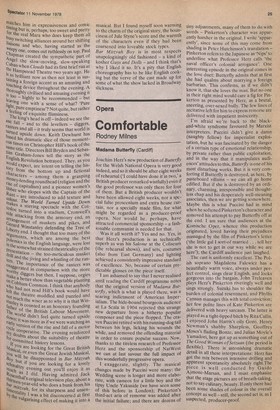Opera
Comfortable
Rodney Milnes
Madama Butterfly (Cardiff) Joachim Herz's new production of Butterfly for the Welsh National Opera is very good indeed, and so it should be after eight weeks of rehearsal (`I could have done itrin two,' a British producer remarked wistfully) even if the good professor was only there for four of them. But a British producer wouldn't have been allowed eight weeks, nor a special false proscenium and extra house curtain, nor a specially made film, for what might be regarded as a producer-proof opera. Nor would he, perhaps, have attracted commercial sponsorship — a fashionable communist is needed for that.
Was it all worth it? Yes and no. Yes, in that Herz's production is as technically superb as was his Salome at the Coliseum (the rehearsal shows), and sets, costumes (also from East, Germany) and lighting achieved a consistently impressive standard of excellence. No, because of certain predictable glosses on the piece itself. am ashamed to say that I never realised until reading the Cardiff programme notes that the original version of Madama Butterfly, which is what is played there, was a searing indictment of American Imperialism. The hide-bound bourgeois audience at La Scala in 1904 rejected this strange new departure from a hitherto popular composer and the piece flopped. The craven Puccini retired with his running-dog tall between his legs, licking his wounds the while, and removed the offending material in order to ensure popular success. Now, thanks to the tireless research of Professor Herz and the sponsorship of NatWest we can at last savour the full impact of this wonderfully progressive opera. I exaggerate, slightly. The musical changes made by Puccini were many: the Wedding scene is longer and more elaborate, with cameos for a little boy and the tipsy Uncle Yakuside (we have seen some of this before in London); Pinkerton's third-act aria of remorse was added after the initial failure; and there are dozens of tiny adjustments, many of them to do with words — Pinkerton's character was apparently harsher in the original. I write 'apparently', since some of this may come from shading in Peter Hutchinson's translation — Pinkerton refers to the Japanese as 'Nips' to underline what Professor Herz calls 'the naval officer's colonial arrogance'. One interesting episode in the original comes in the love duet: Butterfly admits that at first she had qualms about marrying a foreign barbarian. This confirms, as if we didn't know it, that she loves the man. But no one in their right mind would care a fig for Pinkerton as presented by Herz, as a brutal, sneering, over-sexed bully. The few lines of recitative left for him to express remorse are delivered with impatient insincerity. I'm afraid we're back to the blackand-white syndrome favoured by Marxist interpreters. Puccini didn't give a damn (naughty fellow) for imperialist exploitation, but he was fascinated by the danger of a certain type of emotional relationship, by private rather than public exploitation, and in the way that it manipulates audiences' attitudes to this, Butterfly is one of his most disturbing works. But it is very comforting if Butterfly is destroyed, as here, by pasteboard villains — we can all go home edified. But if she is destroyed by an ordinary, charming, irresponsible and thoughtless chap and his desperately well-meaning associates, then we are getting somewhere. Maybe this is what Puccini had in mind when he softened Pinkerton's character and removed his attempt to pay Butterfly off at the end. I am sure that audiences at the Komische Oper, whence this production originated, loved having their prejudices massaged by the film of Pinkerton's letter ('the little gal I sort-of married . . . tell her she is not to get in our way while we are here'); the Cardiff audience just laughed.
The cast is uniformly excellent. The Polish soprano Magdalena Falewicz has a beautifully warm voice, always under perfect control, sings clear English, and looks gorgeous into the bargain. John Treleaven plays Herz's Pinkerton rivetingly well and sings strongly. Suzuki has to shoulder the burden of colonial resentment, and Phyllis Cannan manages this with total conviction; her few polite lines of Kate Pinkerton are delivered with heavy sarcasm. The latter is played as a tight-lipped bitch by Rita Cullis.
I enjoyed John Harris's oily Goro, Henry Newman's shabby Sharpless, Geoffrey Moses's flailing Bonze, and Julian Moyle's Yamadori, here got up as something out of The Good Woman of Setzuan (the period is flexible). There is astonishing dramatic detail in all these interpretations: Herz has got the mix between intensive drilling and apparent spontaneity absolutely right.The piece is well conducted by Guido Ajmone-Marsan, and I must emphasize that the stage pictures are of breath-taking, not to say culinary, beauty. If only there had been some shades of colour in the overall concept as well — still, the second act is, as I suspected, producer-proof.


































 Previous page
Previous page